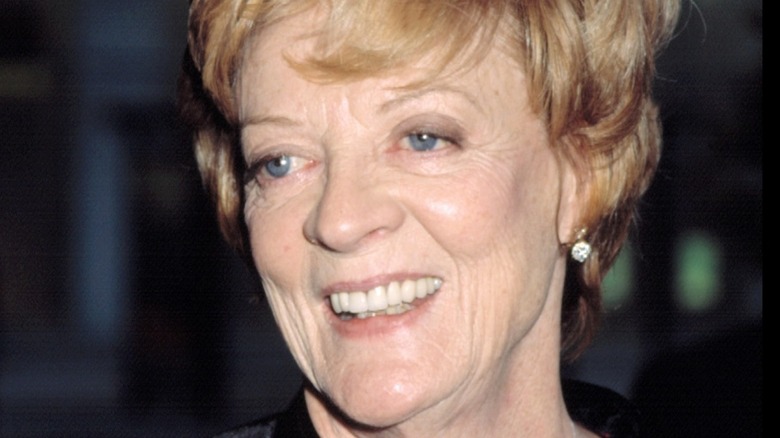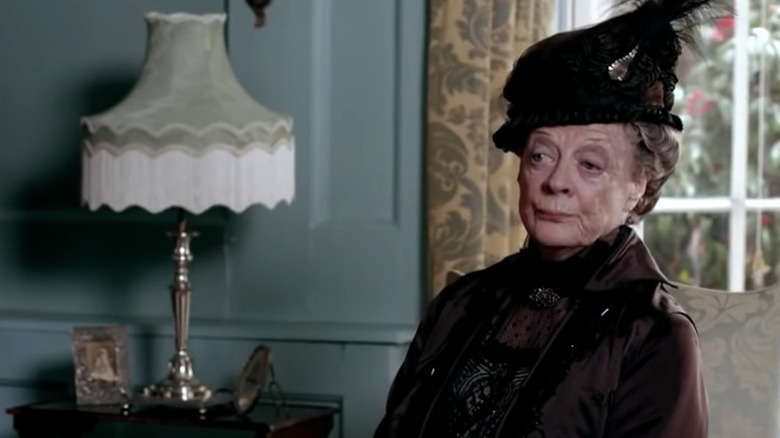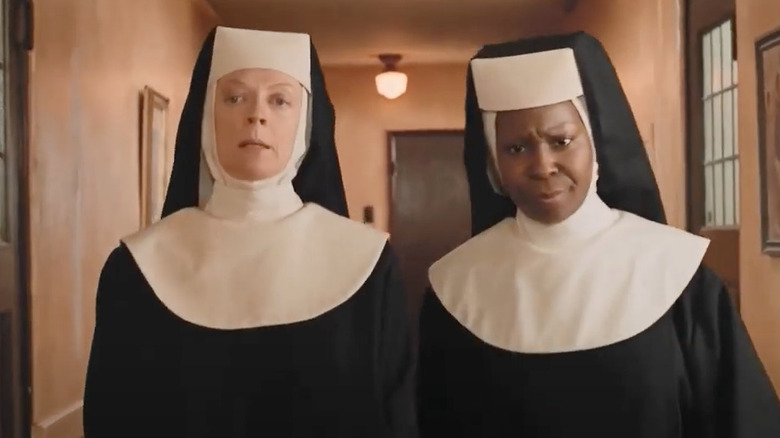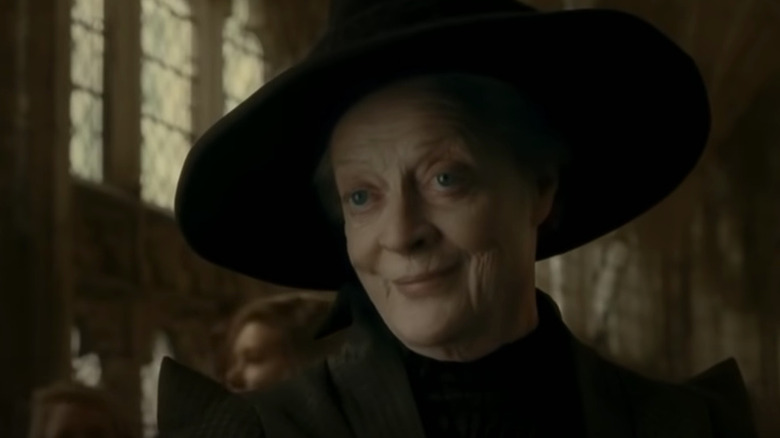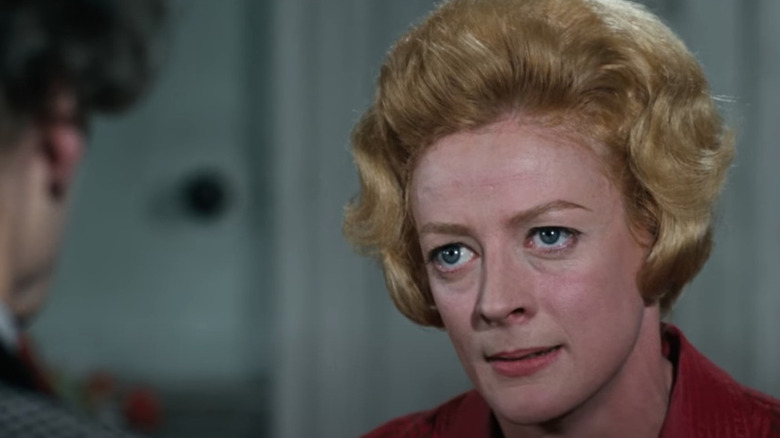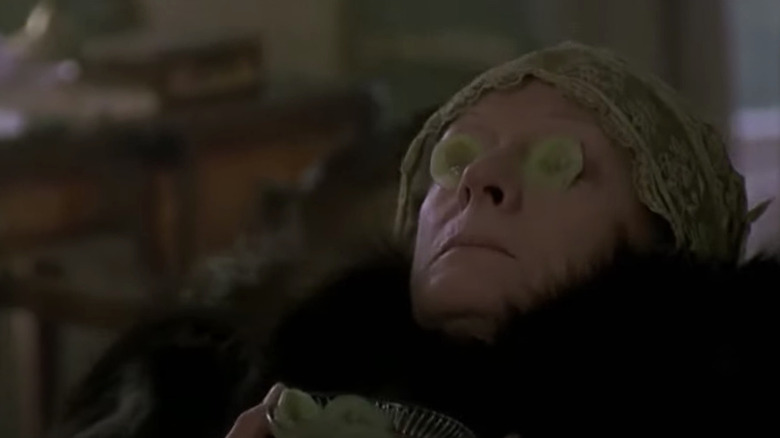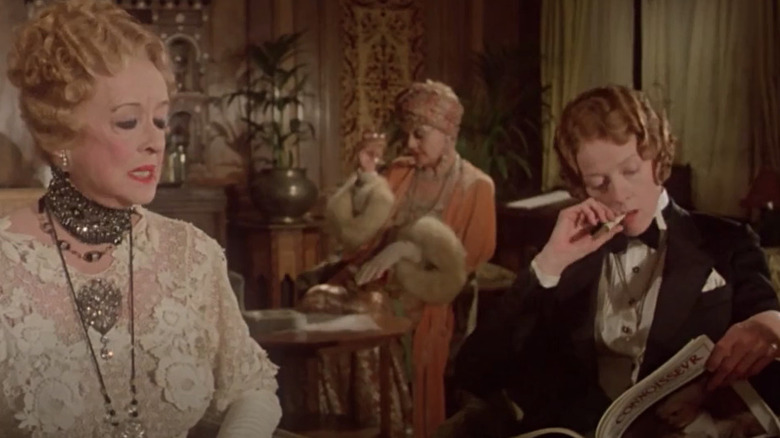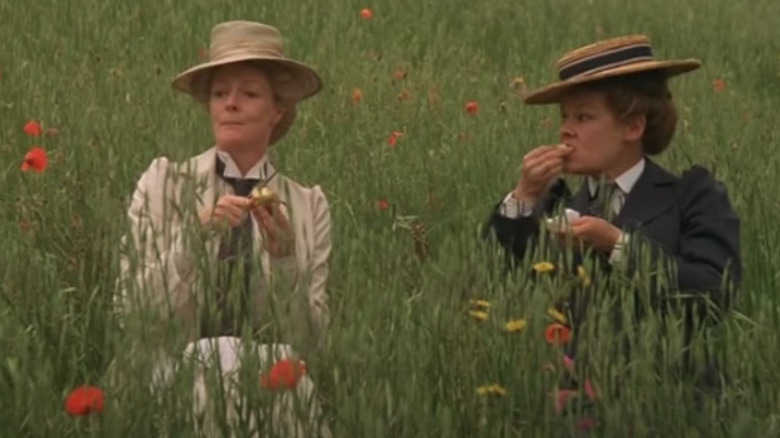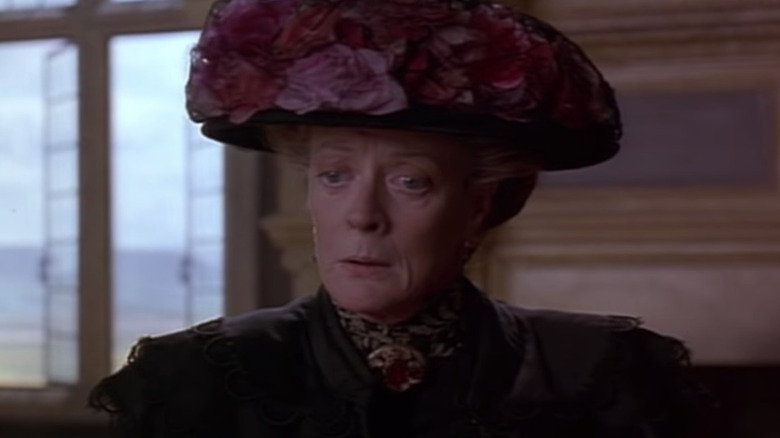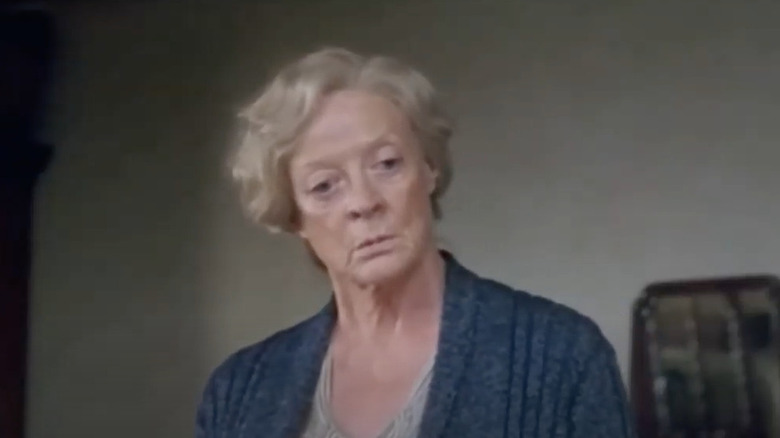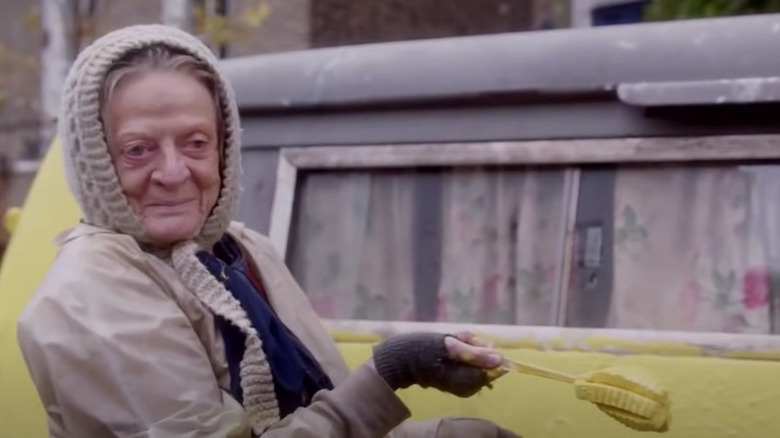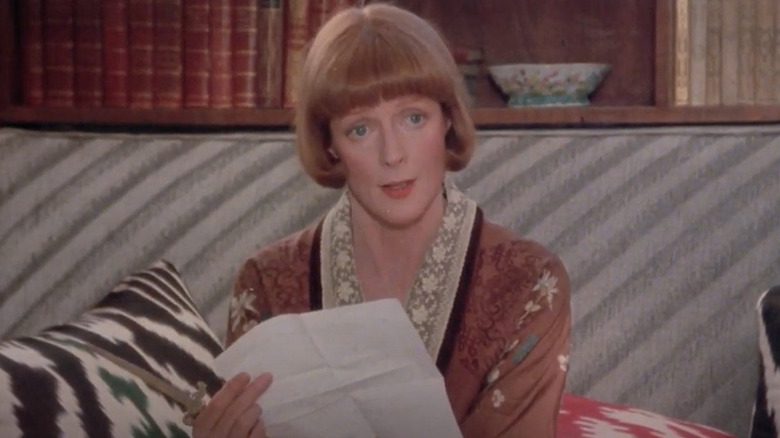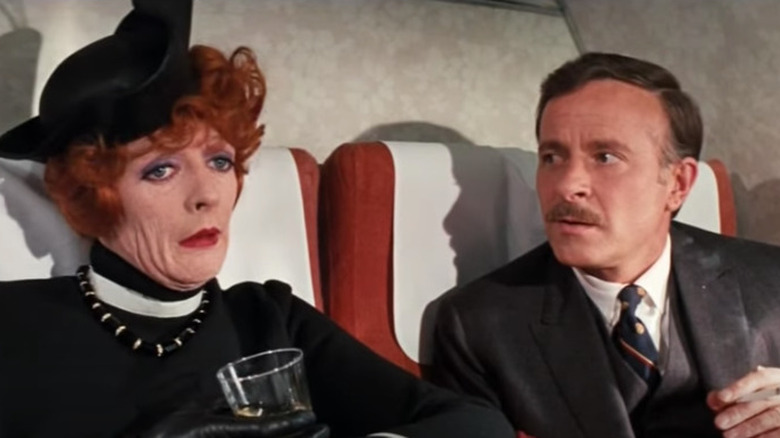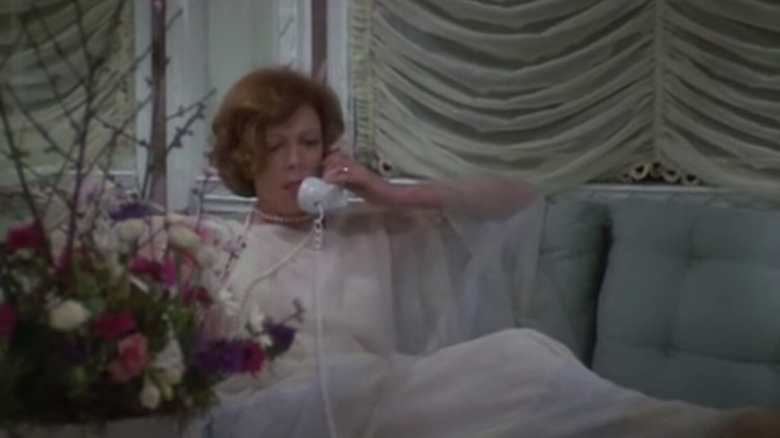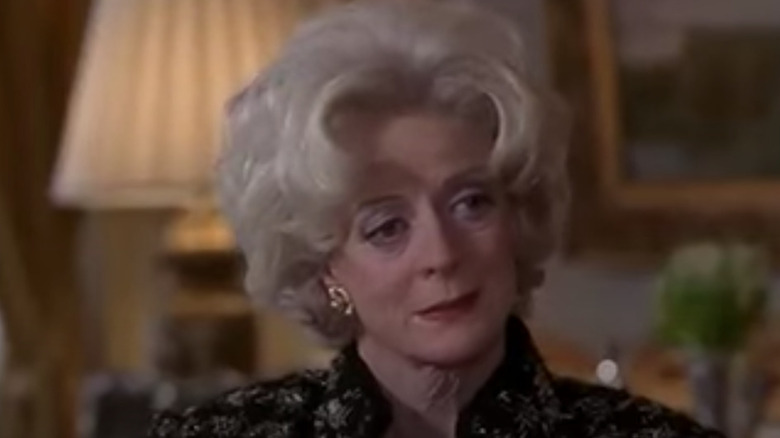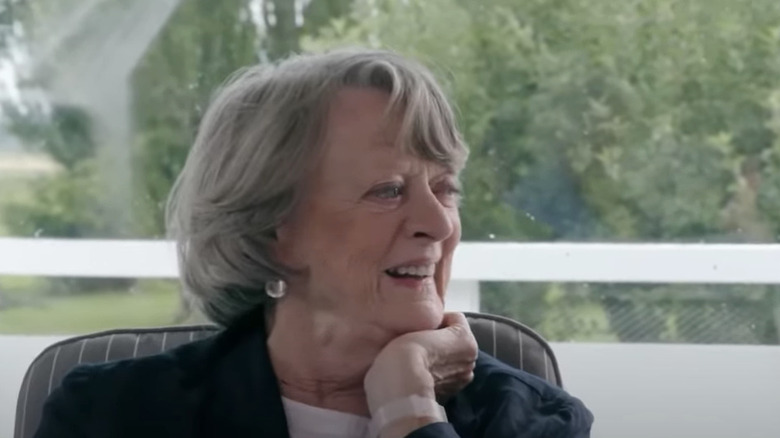Maggie Smith's Best Movie And TV Roles
In an ever-changing world, there are few reliable constants, and for many people, Dame Maggie Smith is just that. Smith began her acting career at 17 when she played Viola in "Twelfth Night" at the Oxford Playhouse in 1952, via Turner Classic Movies. She made her Broadway debut just a few years later in the "New Faces of '56" and was asked by Sir Laurence Olivier to join the National Theater Company in the 1960s. Smith quickly became a fixture in the theater world, winning numerous Tonys and other major awards throughout her lifetime.
Smith's impressive theater career was matched only by her film and television projects. Smith's first film credit was in "Nowhere to Go" in 1958, which landed her the first of her 18 BAFTA nominations. Smith would go on to win the "Triple Crown of Acting" a record seven times: an Academy Award, an Emmy, and a Tony, via The Washington Post. With her work ranging from drama to Shakespeare to comedy, Smith proved that she could do it all. While those who may have come across her in recent years may only know her as a dry, closed-off older woman hiding a secretly lovable or interesting side (per BBC), Smith's best film and TV roles show that she's much more than that.
Violet Crawley (Downton Abbey)
Maggie Smith is primarily known as an actor of the theater and film, but her role as Violet Crawley in "Downton Abbey" has solidified her place in the annals of TV history and brought this dame to a whole new generation of viewers. The period drama "Downton Abbey" follows the aristocratic Crawley family and their servants as they experience social changes and upheavals in the first half of the 20th century.
Although Smith has called this and her "Harry Potter" work not "what you'd call satisfying" as she didn't really "feel like [she] was acting in those things" (via The Guardian), fans found her portrayal of this Countess of Dowager as anything but, per Screen Rant. After all, the shady Crawley loves to put people in their place with her sardonic, witty remarks, and only Smith could embody this character with such dry humor and talent.
Viewers couldn't help but love this Crawley matriarch as they watched her navigate the ages and world events like WWI and the sinking of the Titanic. Smith so often represents the old world, and she does it to perfection in "Downton Abbey," as Crawley tries to resist the change she so deeply detests. The world looks less and less like the one she once knew, and she wants to hold onto the old values and ways best she can. But rather than coming off like a dinosaur, Smith turns Crawley into someone who's lovable, watchable, and satisfying for viewers.
Mother Superior (Sister Act)
It makes sense that Maggie Smith joined Whoopi Goldberg in the comedy, "Sister Act;" between EGOT-winner Goldberg and Triple Crown-winner Smith, there's an infinite pool of talent. The "Sister Act" films see Goldberg as Deloris, a woman forced to go into hiding with the witness protection program, which places her in a convent. There, she revamps the nuns' choir and discovers that there's more under the habit than meets the eye. Smith plays the Reverend Mother, a no-nonsense woman who butts heads with Deloris as the two of them have very different approaches to life.
Smith's Reverend Mother is the perfect foil to Golberg's Deloris, and audiences agreed as "Sister Act" grossed $231 million worldwide, per The Numbers. Some of the best comedies play off the "straight man" trope — the character who keeps their cool while wackiness surrounds them — and Smith brings that energy as she tries to maintain order in the midst of Goldberg's chaos. Mother Superior is attached to an old-world order, but what makes this role so memorable is that she does open up to the new world (and even embraces it). Smith brings her trademark combination of wryness and delightfulness to Mother Superior. The "Sister Act 3" sequel is getting some movement at Disney+, and while there isn't yet word on Smith's return, fans can only hope to see her don the wimple one more time.
Minerva McGonagall (Harry Potter)
The release of the first "Harry Potter" film in 2001 introduced audiences worldwide to Maggie Smith as Minerva McGonagall, a Hogwarts professor who is head of Gryffindor House and later becomes headmistress of the school. Smith plays Minerva in seven "Harry Potter" films total, which changed her life as she suddenly found that "a lot of very small people" she hadn't existed to until she appeared in "Harry Potter" began to "to say 'hello' to [her]" (via Graham Norton). Children and adults alike fell under the spell of Smith's Minerva, a formidable witch and the queen of Transfiguration and turning into a tabby cat.
Professor McGonagall is a disciplinarian who adheres to the rules but has a soft, sassy, and mischievous spot within as she tries to guide the students onto the right path. Her presence can be comforting, particularly in a place like Hogwarts, where things literally transform all the time. Minerva has a strong moral compass and quick wit, which is something that Smith embodies easily. Smith's contribution to "Harry Potter" goes even deeper as Daniel Radcliffe has noted that she was the one who got him the role in the first place. In an interview with Stephen Colbert, Radcliffe said when he was nine, he did a BBC adaptation of "David Copperfield" where he met Smith. She then recommended him for "Harry Potter," and the rest is Hogwarts History.
Jean Brodie (The Prime of Miss Jean Brodie)
By the time Ronald Neame's "The Prime of Miss Jean Brodie" was released in 1969, Maggie Smith already had a decade's worth of work under her belt. However, this film brought her attention from a larger audience when she nabbed the best actress Oscar for her role. Smith plays Jean Brodie, a teacher at a girls' middle school in 1930s Edinburgh, Scotland. Although the time and place both demand a certain type of education for female pupils, Jean rebels to teach her charges about life, love, and (questionable) politics as she idolizes Mussolini and Franco.
For those who only know Dame Maggie Smith as a witty authoritarian, "The Prime of Miss Jean Brodie" offers a different look at this actress. Jean is a woman who feels so strongly that she's in the prime of her life that she can't — or shouldn't — be touched; her ego drives her as she embodies authority in a wild and reckless way, straddling the line between encouraging her students' individualism and molding them in her image. As Jean butts heads with the strict headmistress, Miss Mackay (Celia Johnson), and loses power over some of her students, Smith effectively portrays the different sides of a woman struggling to hold onto control and self-delusion. Whether you're a Maggie Smith superfan or not, this 1960s gem is worth checking out as its depiction of authority and education rings true even today.
Constance (Gosford Park)
Robert Altman's "Gosford Park" is an ensemble, whodunit murder mystery set on a sprawling English estate in the 1930s. A weekend shooting party turns deadly when the party's host turns up dead. While the police struggle to figure out who killed him, the unseen-but-all-seeing servants offer some clues as to what the elite guests' motives could have been. Maggie Smith plays Constance, the Countess of Trentham, a woman of acerbic wit, little patience, and self-proclaimed to not have a "snobbish bone in [her] body," who holds onto the rules and proprieties of the old world so strongly that she can't possibly see her new maid Mary (Kelly Macdonald) as more than a dog to be trained.
Julian Fellowes wrote the screenplay for "Gosford Park," and when he later created "Downton Abbey," he originally intended for it to be a spin-off from this Altman film, per The Independent. He scrapped those plans and decided to use the film as inspiration instead, but clearly Smith's Countess of Trentham made an impression on him as he'd bring her on as Violet Crawley in "Downton Abbey." In typical Altman fashion, "Gosford Park" is more about characters than a crime, via The New Yorker, and although she's in a supporting role, Smith shines as Constance. The film explores the disparities between the upstairs and downstairs in this monstrously aristocratic world, which led to its critical success according to Rotten Tomatoes. In fact, many have cited it as one of Altman's best films, which he made just five years before his death.
Miss Bowers (Death on the Nile)
The 1978 film "Death on the Nile" sees Maggie Smith onboard a crime- and A-lister-filled ship where she gets involved in a murder mystery, along with other suspects played by Angela Lansbury, Olivia Hussey, and Mia Farrow. Based on Agatha Christie's 1937 novel of the same name, the film follows Christie's famed Belgian detective, Hercule Poirot (Peter Ustinov), as he investigates the murder of a young woman on a paddle steamer heading down the Nile. Smith plays Miss Bowers, a butch caretaker who offers her employer, Marie Van Schuyler (Bette Davis), massages and sarcastic comments in equal measure.
"Death on the Nile" offers viewers a glimpse of a new side of Smith as she embodies a less wealthy and feminine role than her typical fare. Although Smith possesses her typical dry wit, in this setting she plays a character who's a bit freer, and the film overall is a campy delight. It's worth it to see her verbally spar with Bette Davis, against whom Smith holds her own; in this battle of the American and British screen legends, we all come out winners for being lucky enough to see them together in a film. Kenneth Branagh's remake of "Death on the Nile" will be released this year with Dawn French taking on the role of Miss Bowers, but it's hard to imagine how Smith's shoes will be filled.
Charlotte (A Room with a View)
James Ivory's 1985 film "A Room with a View," based on E. M. Forster's novel, brings Maggie Smith to a room with a view in Florence 1907. The film centers around Lucy (Helena Bonham Carter), a young woman who takes a trip to Italy with her cousin and chaperone Charlotte (Maggie Smith), who's prudish and strict. Lucy is engaged to a man back in England but falls for George (Julian Sands), a British man staying at the hotel. Charlotte tries to reign her cousin in and protect the family from scandal, but she's no match for love.
Maggie Smith takes up a familiar role in this Forster classic. A stickler for rules, she tries to keep Lucy in line but does let "loose" in the company of Eleanor Lavish (Judi Dench), a romance writer and old friend. It's a delight to see Smith and Dench on screen together as the two gossip privately, remembering the days when they too were young women throwing caution to the wind (as much as one could in the 1800s). Smith's mischievousness peeks through her rigid exterior, infusing the uptight Charlotte with a deeper layer. "A Room with a View" is one of several collaborations between director James Ivory and screenwriter Ruth Prawer Jhabvala, and this formidable team gives Smith much to work with. Critics agreed as the film won three Oscars and five BAFTAs, per IMDb, and was included in BFI's list of the top 100 British films of the 20th century (via BBC).
Mrs. Medlock (The Secret Garden)
Agnieszka Holland's "The Secret Garden" brings audiences into the opening mind of a young orphan trying to find some joy in the world. Set in 1901, the film is about 10-year-old Mary (Kate Maberly), who's sent from India to England to live with a mysterious uncle, Lord Craven (John Lynch), she's never met. Mary's parents have died, and her uncle is mostly away on business, so she's left under the care of Mrs. Medlock (Maggie Smith), Lord Craven's housekeeper. Mrs. Medlock wants Mary to stay out of the way, so Mary explores her uncle's massive estate, where she finds a secret garden that may hold the key to her happiness.
Smith takes on a familiar role of an uptight and standoffish authority figure in "The Secret Garden," but similarly to her role in "Harry Potter," her presence in this children's movie is what stands out and makes it one of her more beloved films, per Screen Rant. Smith's harshness and need for order juxtapose Mary's discovery of the secret garden, a place where she can be wild and free. As with all of her work, though, Smith brings something sincere to Mrs. Medlock, as she harshly chastises Mary for endangering her cousin Colin (Heydon Prowse) one moment and succumbs to tears the next after Colin yells at her. There's a vulnerability under that tough outer shell, which makes Smith's work in "The Secret Garden" a favorite for many fans.
Janet (Ladies in Lavender)
The friendship of Dame Maggie Smith and Dame Judi Dench goes back to the 1950s, when they met at the Old Vic, and audiences have been lucky enough to witness their chemistry in a number of films, via ABC News. "A Room with a View," "The Best Exotic Marigold Hotel," and "Tea with Mussolini" all brought these friends together. Their biggest collaboration is in Charles Dance's "Ladies in Lavender," in which they play sisters whose lives are shaken up by the arrival of a mysterious young man. Janet (Maggie Smith) and Ursula (Judi Dench) are two single sisters living comfortable lives in a seaside village in 1936. A Polish man, Andrea (Daniel Brühl), gets shipwrecked near the village, and the sisters take him in, which stirs up feelings in Ursula and unsettles the balance the sisters once had.
"Ladies in Lavender" is primarily a vehicle for Smith and Dench (albeit a very cozy and slow-moving one), who showcase their natural talents and ease with each other as sisters who believe they know what's best for each other. Smith's Janet is a widow who has had experience in love and loss, and perhaps that's why she's so protective over Ursula; she feels that there's more to lose when it comes to love. The two dames bring their strengths to this sleepy coastal village, and Smith embodies someone who's gotten so comfortable and settled, she doesn't realize there's any movement left.
Mary (The Lady in the Van)
"The Lady in the Van" tells the true story of Mary Shepherd (Maggie Smith), an unhoused woman who spends 15 years living in a van parked in the driveway of writer Alan Bennett (Alex Jennings). The film centers around the developing friendship of Alan and Mary, as Alan discovers the life that Mary left behind as a gifted pianist and the series of events that brought her to living in a dilapidated van in his driveway. Alan tries to navigate the issues in his own life — his career and family — while taking care of Mary, a crabby and curmudgeonly woman who needs him as much as he needs her.
Smith had previously portrayed Mary in theater and radio adaptations of Bennett's 1990 memoir, and her turn in this film adaptation is a highlight of her career. Smith perfectly embodies Mary's combination of humor, eccentricity, intellect, and heart as she steamrolls her way into Bennett's life (his initial offer for her to stay for three weeks turns into a cool and casual 15 years). It's a departure from many of Smith's other roles as Mary is anything but uptight, proper, or meticulous; but Smith imbues her with a humanity and depth that may have been missing had someone else done so. Yes, Mary cracks the jokes, but she certainly isn't in one; instead, with Maggie Smith at the wheel, this is Mary's world, and we're all just living in it.
Lois (Quartet)
A few years before "A Room with a View," Maggie Smith teamed up with James Ivory for "Quartet," another period piece about a different young and beautiful woman (not to be confused with the 2012 "Quartet," also starring Maggie Smith). "Quartet" takes place in 1927 and follows Marya (Isabelle Adjani), who's left in dire straits after her husband goes to jail. A couple takes her in: H.J. (Alan Bates) and his wife Lois (Maggie Smith), who have an unconventional relationship in the sense that H.J. invites young women to stay in their apartment and have affairs with him, and Lois ignores this so he won't leave her. Marya finds herself in the midst of this triangle of manipulation and passive aggression and struggles to find her way out of it.
"Quartet" centers around the idea of women being trapped. Marya and Lois are at odds, walking a tightrope of tension as they each fall into the trap of H.J., who seems to promise freedom but ultimately can't and won't deliver. Smith plays a woman who tries to find strength and power in a humiliating situation, so she goes after Marya, an easier target than H.J. Life isn't what Lois thought it would be, but it's still easier to hold onto that — and the illusion of her dreams — than to let it go. It's a feeling to which many can relate, even if the situation isn't relatable, and Smith brings this to life in a dark way.
Augusta (Travels with My Aunt)
Maggie Smith gets to show off her comedic chops in legendary director George Cukor's 1972 film "Travels with my Aunt." Based on Graham Greene's 1969 novel of the same name, the film follows Henry (Alec McCowen), a respectable middle-class man who meets his previously unknown aunt Augusta (Maggie Smith) at his mother's funeral. Augusta invites Henry to join her on a trip to Europe, where he's dragged into her wacky and wild world of ransom plots, smuggling, illegitimate children, and overall fun.
The typically dry and witty Smith gets a change in this film as she and Henry travel around Europe remembering her old erotic exploits (while picking up some new ones). In the spirit of "Auntie Mame," Smith's Augusta is a whirlwind, a flamboyant and wise-cracking tornado blowing through Europe and taking everything in her path. It's a break from Smith's more typical fare, and so while this film doesn't have the depth of some of her others, "Travels with my Aunt" shines as it lets viewers see a whole new side of Maggie Smith.
Diane (California Suite)
The Neil Simon-penned "California Suite" is a glimpse into the worlds of various guests in a posh hotel, told in four different vignettes. Maggie Smith plays Diana Barrie, an actress who's nominated for an Oscar for the first time staying in the hotel with her husband, Sidney (Michael Caine). Her anxiety around her career and marriage-of-convenience to Sidney, a gay antique dealer, bubbles to the surface. Diana is sure she won't win, her career will stall out, and her marriage will fall apart, and yet she has to prepare for this biggest night of her life.
Diana realizes that the reality of her dreams is different from the fantasy of them. She knows that she won't win, and yet she wants to; more than that, she has hope that she will. Her marriage has become toxic as her once-closeted husband is now not-so-closeted, and yet neither will leave. Instead, they hold each other back, keeping each other in this relationship of "twits," a word tossed around as a term of endearment as much as an insult. Smith seems to depict the stages of grief within Diana — moving from anger to despair to hope — and does so sometimes all at once. In a meta turn of events, Smith's portrayal of an actress nominated for an Oscar actually led to her winning the Oscar for best supporting actress for "California Suite" in 1979, marking this as one of Maggie Smith's best roles to date.
Gunilla Garson Goldberg (The First Wives Club)
With the release of "The First Wives Club" in 1996, women all over the world found a new resonance in Lesley Gore's "You Don't Own Me" as an anthem of self-empowerment and individualism. Hugh Wilson's film follows Brenda (Bette Midler), Annie (Diane Keaton), and Elise (Goldie Hawn) as three estranged college friends who reunite after the death of their old friend Cynthia (Stockard Channing). Annie, Brenda, and Elise have all been left by their husbands for younger women, and the three of them team up to take revenge on their exes who hurt and humiliated them. Maggie Smith appears as Gunilla Garson Goldberg, a rich socialite who uses her money and connections to help the First Wives take down their husbands.
Although Smith is in a supporting role here and doesn't exactly play against type, she still adds her characteristic charm to a film that's bursting with both. After all, who doesn't want to see Maggie Smith helping Goldie Hawn, Bette Midler, and Diane Keaton take down their selfish exes and, on a bigger scale, the patriarchy itself? Audiences certainly wanted to as the film made $181.5 million worldwide (per The Numbers) and was rebooted in 2019 for BET to feature an all-new cast of women of color (such as Jill Scott and Michelle Buteau).
Herself (Nothing Like a Dame)
Perhaps one of Maggie Smith's most memorable roles is the one in which she doesn't play anyone at all but herself. Roger Michell's 2018 documentary "Nothing Like a Dame" (released as "Tea with the Dames" in the U.S.) sits down for an afternoon of tea and gossip with the biggest dames around: Maggie Smith, Judi Dench, Joan Plowright, and Eileen Atkins. The film explores the careers of each of these women and lets them speak for themselves and to each other about their experiences, work, and lives.
"Nothing Like a Dame" shows Maggie Smith at her funniest, easiest, and most delightful and insightful self. All of the women speak candidly about themselves and their histories, both personal and professional, which sometimes mixed as was the case with Joan Plowright, who married Laurence Olivier. When the four of them talk about how "difficult" he was, Smith notes, deadpan, that she "scared the wits out of [Olivier] from time to time." It's a particular delight to see Smith and Dench joking together, as Smith often makes Dench laugh so hard that she wheezes. The film offers a special look at the lives of these greats, so whether you're a Maggie Smith fan or not, stop in for an afternoon cuppa with the dames.
